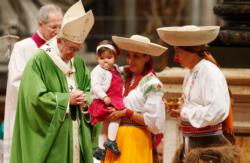Some of the migrant children under age 5 separated from their families by the government were reunited with loved ones [last week] with help from Catholic organizations.
About two dozen families in all were brought back together on that date with help from the U.S. Conference of Catholic Bishops’ Migration and Refugee Services, Catholic Charities USA and a network of other agencies from around the country.
In all, the Catholic agencies will help reunite 55 families by mid-July and provide short-term care, such as food and shelter, said Bill Canny, executive director of MRS.
“Protection of families is a foundational element of Catholic social teaching and this moment calls on all people of goodwill to lend a hand to reunite these children with their parents,” said a joint statement issued the same day by MRS and Catholic Charities USA.
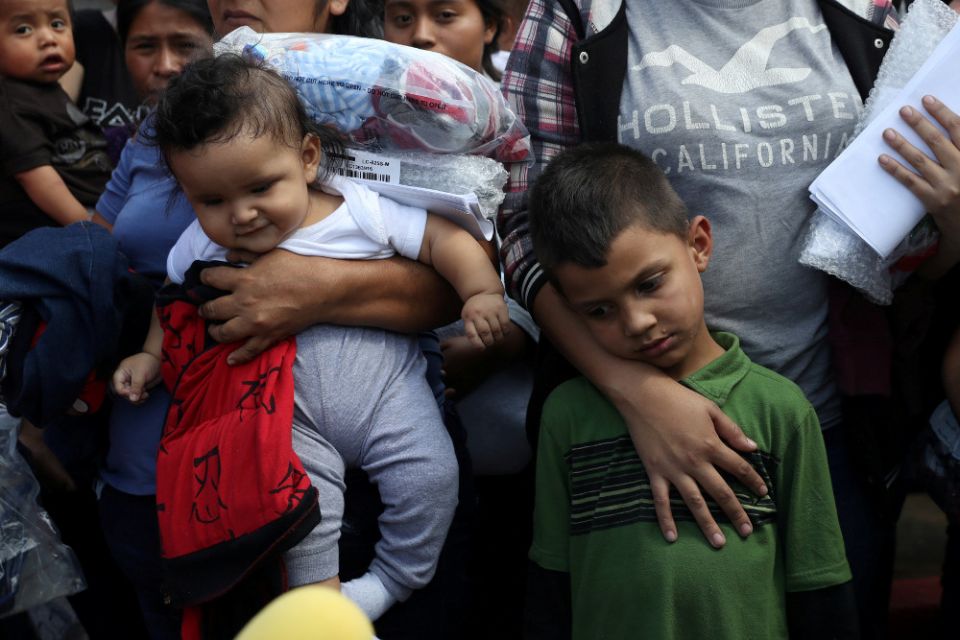 The children and families were earlier separated by a policy implemented by the Trump administration at the U.S.-Mexico border, seeking to deter illegal border crossings. U.S. Attorney General Jeff Sessions said in May that people risking improper entry would be subject to having their children taken away, if caught.
The children and families were earlier separated by a policy implemented by the Trump administration at the U.S.-Mexico border, seeking to deter illegal border crossings. U.S. Attorney General Jeff Sessions said in May that people risking improper entry would be subject to having their children taken away, if caught.
The Catholic Church, along with much of the country, condemned the policy and has been advocating for the families’ reunification. After much public outcry and widespread condemnation of the family separation policy, President Donald Trump signed an executive order June 20 saying families would no longer be separated but may be detained together during the process of prosecution and deportation at the border.
The U.S. bishops have expressed concerns with that possibility, asking for alternatives to detention, but seemed intent on lessening the damage already done.
The families of children under 5 that the Catholic organizations helped were reunited at government facilities and then transferred into the care of Catholic Charities organizations around the country, as well as the Annunciation House in the El Paso, Texas/Juarez, Mexico, border region.
They will be assisted with follow-up care for two months as many will leave the facilities and head toward a destination with family or a sponsor somewhere in the U.S.
Canny said the U.S. Department of Health and Human Services as well as the Office of Refugee Resettlement reached out to the Catholic organizations, as well as the Lutheran Immigration and Refugee Service in early July to help with the reunifications.
Immigrant children are released from detention in McAllen, Texas.”They know we are able to tap into a vast Catholic network across the country, which proves valuable for humanitarian and disaster response,” he said.

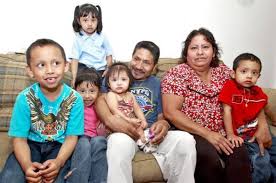 This happy family scene might not have been possible without
This happy family scene might not have been possible without 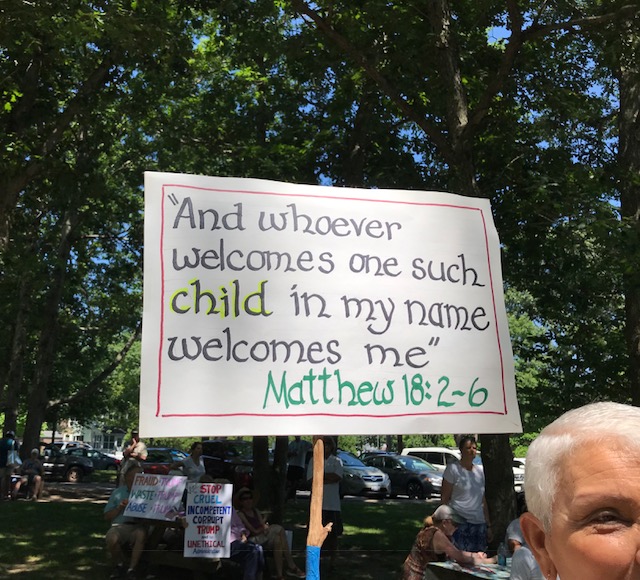 One of the many rallies held around the nation on June 30th to protest the separation of families who have crossed the border into the United States occurred in the sleepy village of East Quogue, in the Town of Southampton, NY. Organized by MoveOn.org. during the weeks following the news of the separation of children from parents, this peaceful rally attracted a few hundred people and some local politicians.
One of the many rallies held around the nation on June 30th to protest the separation of families who have crossed the border into the United States occurred in the sleepy village of East Quogue, in the Town of Southampton, NY. Organized by MoveOn.org. during the weeks following the news of the separation of children from parents, this peaceful rally attracted a few hundred people and some local politicians.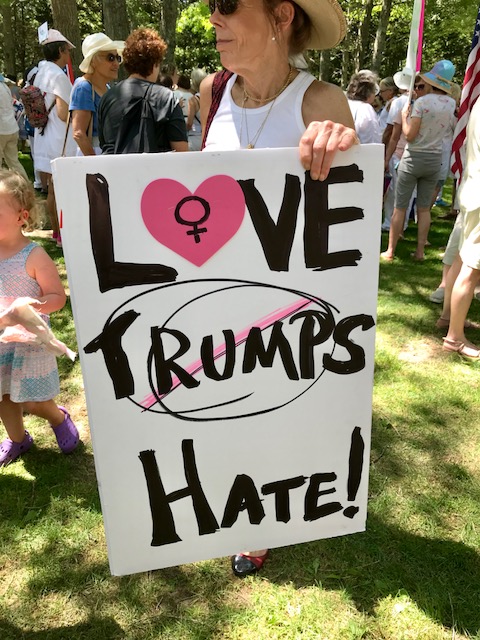 It was moving to see the white villagers and, maybe vacationers, out in support of uniting families, but it was concening that the population most affected was absent. Were they all working to keep lawns manicured, meals prepared and served, and homes cleaned on this sweltering Saturday? Were they afraid to gather in public? Maybe it was a combination of these and other motives. I’m glad we were there to represent ourselves, US citizens who know that our nation is above the the current policies coming out of the White House, and to represent them, the victims of the hate being disseminated by some. ~ by Patricia Krasnausky, President and CEO, Cabirni Eldercare
It was moving to see the white villagers and, maybe vacationers, out in support of uniting families, but it was concening that the population most affected was absent. Were they all working to keep lawns manicured, meals prepared and served, and homes cleaned on this sweltering Saturday? Were they afraid to gather in public? Maybe it was a combination of these and other motives. I’m glad we were there to represent ourselves, US citizens who know that our nation is above the the current policies coming out of the White House, and to represent them, the victims of the hate being disseminated by some. ~ by Patricia Krasnausky, President and CEO, Cabirni Eldercare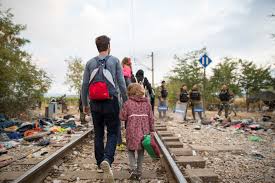
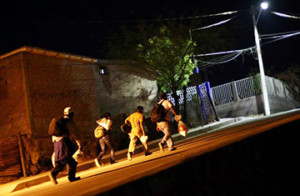 It is a lifeline for people fleeing persecution, war and poverty or simply trying to keep their families together. Immigration law is bewildering even to American lawyers who speak English. It is impenetrable to immigrants, who are often very poor and struggling to navigate a complex legal system in a foreign language.
It is a lifeline for people fleeing persecution, war and poverty or simply trying to keep their families together. Immigration law is bewildering even to American lawyers who speak English. It is impenetrable to immigrants, who are often very poor and struggling to navigate a complex legal system in a foreign language. We are deeply concerned by the announcement that the National Guard will be deployed on the U.S./Mexico Border. The continued militarization of the U.S./Mexico Border distorts the reality of life on the border; this is not a war zone but instead is comprised of many peaceful and law-abiding communities that are also generous in their response to human suffering. We recognize the right of nations to control and secure their borders; we also recognize the need of nations to respect the rule of law. Current law in the United States rightly provides that those arriving to our country fleeing persecution are entitled to due-process as their claims are reviewed. Seeking refuge from persecution and violence in search of a peaceful life for oneself and one’s family is not a crime. Our faith calls us to respond with compassion to those who suffer, and to live in a spirit of solidarity with all human beings. We remain hopeful that our local, state and federal officials will work collaboratively and prudently in the implementation of this deployment, ensuring that the presence of the National Guard is measured and not disruptive to community life. We are also deeply concerned that at this time divisive rhetoric often promotes the dehumanization of immigrants, as if all were threats and criminals. We urge Catholics and people of good will to look past the dehumanizing rhetoric regarding immigrants and remember that they are a vulnerable population, our neighbors, and our sisters and brothers in Christ. ~ United States Conference of Catholic Bishops
We are deeply concerned by the announcement that the National Guard will be deployed on the U.S./Mexico Border. The continued militarization of the U.S./Mexico Border distorts the reality of life on the border; this is not a war zone but instead is comprised of many peaceful and law-abiding communities that are also generous in their response to human suffering. We recognize the right of nations to control and secure their borders; we also recognize the need of nations to respect the rule of law. Current law in the United States rightly provides that those arriving to our country fleeing persecution are entitled to due-process as their claims are reviewed. Seeking refuge from persecution and violence in search of a peaceful life for oneself and one’s family is not a crime. Our faith calls us to respond with compassion to those who suffer, and to live in a spirit of solidarity with all human beings. We remain hopeful that our local, state and federal officials will work collaboratively and prudently in the implementation of this deployment, ensuring that the presence of the National Guard is measured and not disruptive to community life. We are also deeply concerned that at this time divisive rhetoric often promotes the dehumanization of immigrants, as if all were threats and criminals. We urge Catholics and people of good will to look past the dehumanizing rhetoric regarding immigrants and remember that they are a vulnerable population, our neighbors, and our sisters and brothers in Christ. ~ United States Conference of Catholic Bishops 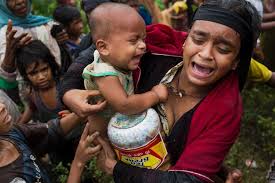 priests, brothers, sisters, and lay professionals and volunteers, have been joyful partners to help accomplish this life-saving, humanitarian work. We know firsthand about the life-saving work that occurs on the ground in our communities to help welcome, accompany and integrate refugees in the United States. Refugees are more than just numbers and statistics, they are our neighbors, our friends, our fellow parishioners, and our brothers and sisters in Christ.
priests, brothers, sisters, and lay professionals and volunteers, have been joyful partners to help accomplish this life-saving, humanitarian work. We know firsthand about the life-saving work that occurs on the ground in our communities to help welcome, accompany and integrate refugees in the United States. Refugees are more than just numbers and statistics, they are our neighbors, our friends, our fellow parishioners, and our brothers and sisters in Christ.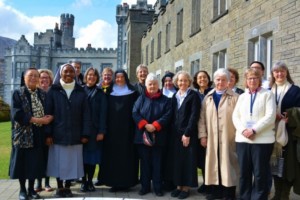 [Last month], sisters working on the front lines in migrant education in places like Italy, the Philippines, Latin America and Nigeria exchanged information and testimonies with scholars who document sisters’ work.
[Last month], sisters working on the front lines in migrant education in places like Italy, the Philippines, Latin America and Nigeria exchanged information and testimonies with scholars who document sisters’ work.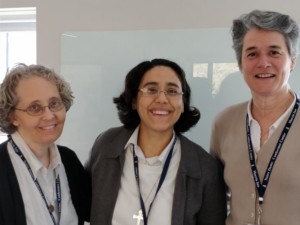 Attending the conference were Sr. Patricia Godoy, MSC; Maria Williams, Cabrini research scholar; and Dr. Maggie McGuinness, former professor at Cabrini College.
Attending the conference were Sr. Patricia Godoy, MSC; Maria Williams, Cabrini research scholar; and Dr. Maggie McGuinness, former professor at Cabrini College.